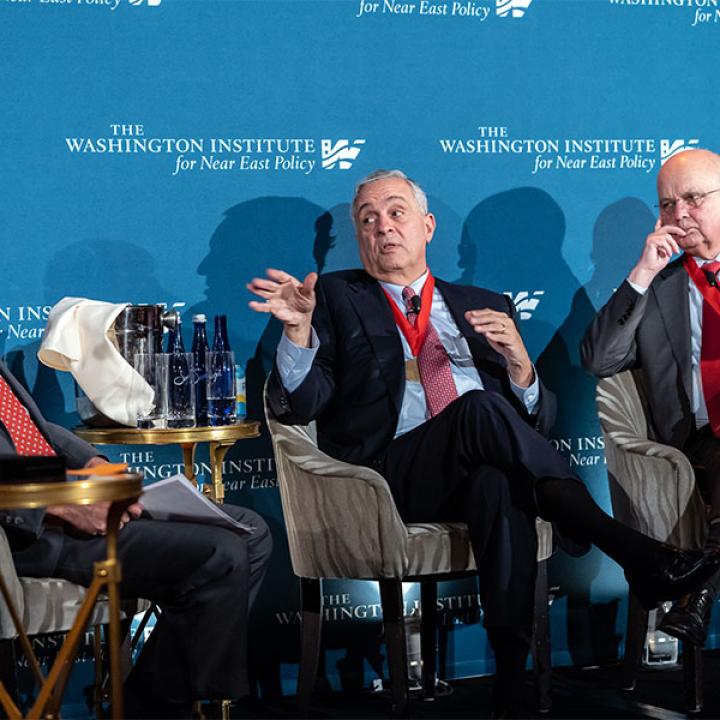
- Policy Analysis
- Interviews and Presentations
Former CIA Directors Michael Hayden and George Tenet Address The Washington Institute

Watch the full conversation between Institute counselor Dennis Ross and 2018 Scholar-Statesman Award honorees Michael Hayden and George Tenet, former directors of the Central Intelligence Agency.
On November 15, 2018, The Washington Institute for Near East Policy presented two former CIA directors, Gen. Michael Hayden (USAF Ret.) and George Tenet, with its Scholar-Statesman Award at an event in New York City. The Institute’s William Davidson Distinguished Fellow, Ambassador Dennis Ross, moderated a discussion with the intelligence experts about current issues in national security in light of their extensive professional experience.
When asked about the possibility of another catastrophic attack similar to 9/11, Hayden explained that “the odds of that happening are really quite low, and that’s a measure of success.” However, he added that the threat of lethal, lone-wolf attacks is “going to be there for a long time.”
Against the background of attacks on the reliability of the intelligence community, Tenet rejected the notion that elected officials would be able to sway the intelligence community to provide biased analysis. “There would be a revolt,” he said, adding that policymakers ultimately have the freedom to accept, reject, or ignore intelligence assessments.
The two intelligence professionals emphasized the importance of close foreign partnerships to U.S national security particularly to intelligence gathering and operations. They warned that alienating foreign partners will undermine critical relationships. Political and intelligence connections “have to be nurtured, fostered, developed, and kept,” Tenet advised.
Expanding on Tenet’s point, Hayden said that his “deepest fear” is that “with ‘America First’ [it will be] ‘America Alone’ if it goes on too long.” He strongly recommended that the CIA director appoint an internal taskforce to study how to conduct U.S. intelligence if Washington loses its foreign partners.
The U.S. decision to withdraw from the Iran nuclear deal or, Joint Comprehensive Plan of Action (JCPOA), was a blow to America’s multilateral relationships, Tenet said. While the JCPOA succeeded in delaying the Iranian acquisition of nuclear arms by eight years and deterring a war, it did enable the Islamic republic to build up its conventional warfare capability and to present a greater threat on Israel’s northern border. The “region has now entered a very dangerous period,” Tenet said.
The Iranian threat is nothing new. Hayden emphasized that Israel and the Sunni Muslim states have considered Iran a common enemy for a number of years. Hayden said that when Israel was contemplating an attack on Iran’s nuclear development infrastructure “I was so convinced of Sunni-Israeli convergence, I would not have been surprised that Israel aircraft would have landed in Saudi Arabia on the return from a strike on Iran, quickly refueled, and flown back to Israel.”
Rapporteur's summary by Washington Institute Communications Associate Gabrielle Burack.




